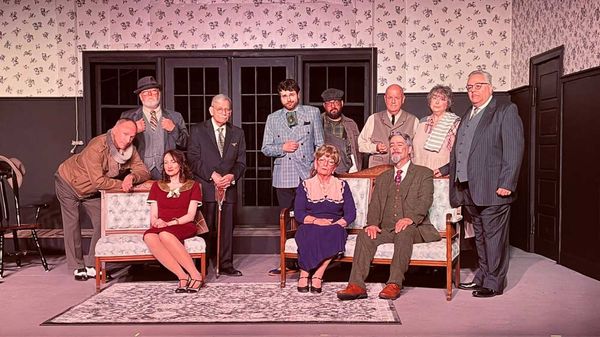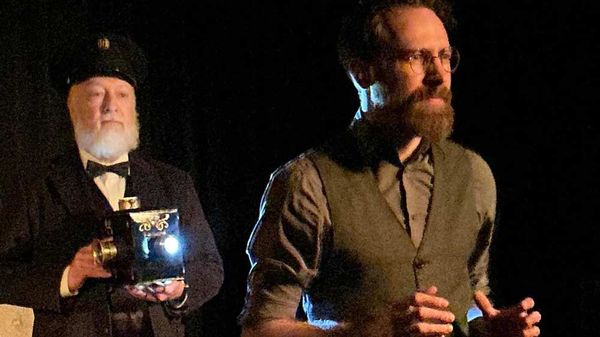July 18, 2011
The Good Doctor
Kilian Melloy READ TIME: 4 MIN.
The Independent Drama Society proves that good productions can come from small theater groups. With "The Good Doctor", the troupe also proves that all good things come to an end; "The Good Doctor" is IDS's final production.
But what a marvelous thing it is. Playwright Neil Simon adapts short stories by Anton Chekhov into shapely, funny, eloquent episodes that are sometimes absurd in a distinctly Russian mode, and sometimes unexpectedly eloquent. The cast take on a variety of roles, but director Christine Toohey keeps the material under control, shaping the evening's entertainment into one controlled burst of frenetic energy after the next.
The play's anchor is an unnamed Writer (we take him to be Chekhov) played by Bob Mussett as a lanky, somewhat fussy, and very much distractible man who suffers from hypergraphia -- the uncontrollable need to write. He's always in a foment about what story to scribble out next, and if nothing comes to mind he suffers terrors and anxiety.
Suitably, the Writer presents us with a wealth of tales, each a literary gem and a theatrical delight. "The Sneeze" is one of those shouts from deep in the Russian soul, an almost Gogol-like farce in which a frazzled, bumbling civil servant from the lower class named Cherdyakov (Brian Tuttle) meets a superior (Zach Eisenstat) at the theater and literally blows it by sneezing on the man, and then pursuing him relentlessly to tender multiple apologies. It's an uproarious farce with a stone sober moral: Power is always unevenly distributed, men are never equal, and the lower classes must tread carefully to appease, and please, the upper classes.
The same point is made in "The Governess," in which an infuriating aristocratic woman, the Mistress (Melissa DeJesus) chisels her governess (Kate Daly) out of her wages, finding endless excuses to garnish her wages. In the end, handing the governess a pittance, the Mistress offers a final insult. She clearly thinks she's doing the young woman a service, but the nature and method of this dubious favor shows only how out of touch the Mistress is with the desperate facts of how power disparities create suffering.
The level of comic energy amps up once more with "Surgery," but even here -- where physical comedy is key -- Simon's adaptation keeps firm hold on literary undercurrents: The inexperienced surgeon's (Mark Estano) patient is the local church sextant (Chris Anton), who is suffering an agonizing toothache. Seldom have Science and Faith presented such an amusing display of chase and tumult.
But it's "The Seduction," which ends Act One, that shows Chekhov and Simon (and this cast) at their finest. An inveterate ladies' man (Eisenstat) with a specialty in seducing the wives of other men sets out to tempt his best friend's (Chris Larson) wife (Sarah J. Gazdowicz). He makes a tutorial out of it for the edification of the audience. But when he does his job too well, he finds that love is a double-edge knife and he's liable to cut himself just as deeply as any of his feminine quarry. None of these roles is easy, but all of them are handled with aplomb by the actors.
In "The Drowned Man," Tuttle returns as a rich man instead of a poor stooge, but he's still a bundle of nerves, utterly hilarious to watch. When he encounters a sailor (Chris Larson) in a bad part of town near the docks, the offer the sailor makes him -- to drown for a fee -- seems both vile and impossible... but also strangely tempting. In just a few minutes, this sketch explores the darkest lusts of the human heart, and demonstrates just how short the road is from virtue to vice.
"The Audition" is one of the funniest pieces, a near solo effort by Sierra Kagen, who plays a young actress from Odessa. She's come a long way on foot for the honor of simply auditioning, and she makes the most of her time before an unseen, autocratic man (voiced by Musset) who seems to be the playwright -- or might, if one wants to take Shakespeare at his word ("All the world's a stage"), just this side of a metaphor away from being God. Okay, forget the highbrow stuff: Kagen is a bustling hoot!
"A Defenseless Creature" presents a keening, unstoppable, and quite possibly mad woman (Victoria Townsend), a peasant who may be half out of her mind but is cunning all the same. When the woman drops in on a bank president (Mark Estano) with a complaint that turns out to have nothing to do with the bank's business, her plea for compensation rapidly escalates into a war of wills -- and she proves not to be quite so defenseless after all.
With "The Arrangement," the play draws to a close. The sketch takes as its subject the common practice (back in the day) of fathers ushering their sons to manhood with a visit to the brothel. Mussett plays the Writer playing his own father; David N. Rogers plays the Writer as a young man; DeJesus takes the stage as the brothel's madam, a no-nonsense sort who, during the course of haggling over her fee, observes the father's affection for his son and tells him, "If I'd had a father like you, I never would have ended up here -- bargaining with fathers like you."
It's with such salty affection, then, that the Independent Drama Society takes its final bow. It will be missed.
Kilian Melloy serves as EDGE Media Network's Associate Arts Editor and Staff Contributor. His professional memberships include the National Lesbian & Gay Journalists Association, the Boston Online Film Critics Association, The Gay and Lesbian Entertainment Critics Association, and the Boston Theater Critics Association's Elliot Norton Awards Committee.







